 |
 |
 |
Part 1 An Appreciation - Part
2 Learning the ropes 1927-51 - Part 3 Centre
stage with City 1951-56 - Part 4 Shuffling off
stage 1956-61 - Part 5 On the march with Leeds
United 1961-67 - Part 6 The agony and the ecstasy
1967-74 - Part 8 Disgrace and despair 1977-89
Don Revie enjoyed a long and colourful career as manager of Leeds United
Football Club, reigning supreme at Elland Road from March 1961 until the
summer of 1974. During that time, his success in building Leeds into one
of the most powerful sides in the country attracted the attention of a
horde of suitors who coveted his talents: Sunderland, Sheffield Wednesday,
Birmingham City, Everton, Manchester United, Torino, Olympiakos and Panathinaikos
had all tried to lure him away from West Yorkshire over the years. Revie,
though, time and time again exercised his option to remain as the Godfather
of the Leeds United Family, using the rewards on offer from others to
help wring improved terms from the tight-fisted directors who ran the
club. Fear of losing the complete control he enjoyed at Elland Road had
always previously deterred him from jumping ship. Things had changed by 1974 in two main respects. Firstly, the challenge that now emerged was the biggest one of all and
possibly the only one that could have persuaded Revie to forsake his beloved
Leeds United. Six months after England's dismal elimination from the World
Cup finals at the hands of Poland, the Football Association had summarily
dismissed Sir Alf Ramsey, the manager who had won them the World Cup.
Buoyed by Leeds' League championship triumph, Revie's stock was as high
as it had ever been and, when the FA hierarchy learned that he might be
open to offers, there was little doubt who would be Ramsey's successor. Secondly, most of the Elland Road squad were fast approaching the veteran
stage. Jack Charlton and Gary Sprake had already departed, and the likes
of Billy Bremner, Johnny Giles, Norman Hunter, Paul Madeley and Paul Reaney
were past their very best and would soon need to be replaced. Revie's
success had been built around these young men, and he dreaded the day
when he would need to show them the door. While he had a few good youngsters
coming through, he had been spoiled by the multitude of young jewels that
had emerged in the Sixties, and was apprehensive about the club's future.
It was clear that radical surgery would be required if Leeds United were
to retain their place at the top of the European game. Revie simply did
not have the stomach for the job. As Lord Harewood, President of Leeds United, said, 'The team was all
the same age. The agony of having to replace them was something he was
glad not to face. He said that it was a fundamental reason for him leaving.
Yet leaving was agony too ... could he bear to leave what he had built
up?' On Wednesday 3 July 1974, Revie met the FA and agreed a deal worth £20,000
a year. The next day the Leeds United board accepted his resignation,
expressing their 'deep appreciation of his loyalty during his 13 years
as manager'. Revie had been under contract at Elland Road until 1979,
with a five-year period as consultant after that. Revie had worked hard
throughout his tenure. His salary at Leeds had been around £17,000. The
only real issue had been one of compensation, and Leeds were promised
financial support to find a new manager, although FA secretary Ted Croker
was quoted as saying: Revie jumped at the challenge and was out of Elland Road in double quick
time, taking Les Cocker with him. He left with the recommendation that
the directors install Johnny Giles as his successor, but his views were
disregarded and instead his long time nemesis Brian Clough was installed. Revie said at the time: 'I am delighted to be given the chance to manage
England. This must be any manager's dream. I also have a feeling of sadness
after 13 years as manager of Leeds. I have tried to build the club into
a family and there must be sadness when anybody leaves a family. The first
result I will be looking for on a Saturday night will always be Leeds
United's. Leeds gave me the chance to start my managerial career and we
have had our ups and downs, but everybody in the club, the directors,
coaching staff and, in particular, the players, have stood by me through
thick and thin. I was in contact with the players about leaving them.
They all understood and said the England job was a little bit special
in their minds. They would have been upset if I had been going to another
club. 'The main object must be to build up for the World Cup in 1978. Four
years seems a long way off, but it isn't. I would like to build England
on club lines. I am going to be interested in the youth policy and work
closely with Allan Wade.' Revie was remarkably sanguine about turning his back on Elland Road and
the men who had given him such support over the years. Syd Owen was abandoned
to his own devices and clearly felt slighted: 'I was disappointed that
having been at the club all that time, having been a loyal servant to
Don, having played a great part in the development of some of the players,
he didn't give his staff the security in football he was looking for himself
in the future ... that he didn't make sure all the coaches and physios
who had served him had been made more secure with contracts. I was at
that club all those years and put in all those hours ... but when I wrote
a letter of resignation, all I got was what I had worked for. I understand
Don had made a signed agreement that he would come back to the club as
a consultant. Having done that, I would have thought he would also have
looked after his loyal servants.' Revie was not one for looking back, and was soon throwing himself enthusiastically
into his new career at Lancaster Gate. This was despite the fact that
there were some at the summit of the game who remained suspicious and
critical of him, particularly Football
League secretary Alan Hardaker, who had tangled with him in bitter
disputes over many years. Variously described over the years as 'the great dictator', 'football's
godfather', 'a cross between Cagney and Caligula', 'the League's answer
to Idi Amin' and 'St Alan of St Annes', Hardaker reigned supreme as Secretary
of the Football League from 1957 to 1979. His successor, Graham Kelly,
confirmed 'Hardaker loathed Revie with a vengeance that can only have
been reserved for a fellow Yorkshireman who he felt had twisted his way
to the top.' He was an opinionated and arrogant autocrat who saw the Football
League as his personal plaything and went out of his way to make life
difficult for Leeds United and Don Revie for reasons best known to himself. Andrew Mourant recalls the enmity that characterised the relationship
between the two men, quoting events from 1970: 'The championship was still possible but at this point Revie elected
to concede to Everton. However, the decision was not shared with the 41,011
spectators who turned up for the Easter Monday away game against Derby
County to discover the Leeds manager was fielding a travesty of a side;
an entire team of reserves. The remaining energy of his star players was
to be conserved for Cup battle. The Derby match was lost 4-1; probably
all Revie deserved. "='In so doing, Revie incurred, not for the first time, the displeasure
of … Alan Hardaker. Over the previous two years, Hardaker had tired of
'According to Hardaker, part of Revie's fixture pile-up was of his own
making; earlier in the season, he had had fixtures put off. Revie's escapade
in flouting League regulations by fielding a weakened team against Derby
County cost the club a £5,000 fine but the Leeds manager was unrepentant.
Hardaker meanwhile was excoriated by many in Leeds for the club's failure
to win a trophy in 1970. 'Their mutual antipathy also extended to the appointment of referees.
Hardaker had taken particular exception to another of Revie's oblique
approaches, through a club administrator, wondering whether a referee
for Leeds' next match might be changed. Again, Hardaker's reply was terse;
that clubs were not, whatever the event, free to select their own officials.' When the FA appointed Revie as manager Hardaker told them bluntly that
they needed their heads examining. There was a war of words in the papers between the two men in October,
as Revie sought to bounce Hardaker by talking of the discussions that
had been held with the Football League secretary. Speaking at a public
luncheon in London, Revie revealed that he had spent nearly six hours
in conference with Hardaker in an effort to obtain more co-operation from
England's top clubs. He said: 'I asked him specifically if Saturday matches
could be postponed so that I could have my squad for a full week before
important World Cup qualifying games. I think it is vital that it can
be arranged. My suggestion was received sympathetically but Mr Hardaker
made some conditions which I am not going to go into at the moment. Sir
Alf only had his squad from the Saturday before the vital game against
Poland. It makes a hell of a difference if the players get together the
previous Wednesday.' Hardaker was not immediately available for comment because of a convenient
throat infection, but a few days later gave short shrift to the claims;
he effectively called the pre-emptive bluff, by saying: 'I have seen my
name mentioned on numerous occasions by Mr Revie, concerning possible
postponements of 'eague matches. These are unauthorised statements and
if Mr Revie wishes to reveal all his business with me to the press then
I wish it to be known that I cannot co-operate. It is true we met in my
office, together with Mr Wragg, chairman of the international committee,
and Mr Croker, secretary of the FA, and discussed future co-operation.
I promised Mr Revie the same co-operation that I gave his predecessor,
but made it quite clear that I have no authority to postpone League matches.
This is the prerogative of the clubs and the management committee. I resent
any suggestion made in public that I have promised to undertake such action.
In any event, premature statements of this nature will only serve to make
the job more difficult.' It was a cynical ploy by Revie, who assumed that his very public revelations
would persuade Hardaker to fall into line. He was right insofar as the
reaction of Fleet Street was to enthusiastically support his proposals,
but he badly miscalculated the reaction of Hardaker, who became even more
embittered and contemptuous of the new England manager. For the moment,
however, he had to bide his time because Revie was enjoying a honeymoon
period with the public. In contrast to the aloof and cool Ramsey, the PR-conscious Revie was
warm and open with the press and cultivated popularity. One of his earliest
ruses was to curry favour with the players on whom he would now depend.
He gathered together 85 England hopefuls for a getting to know you session
in a Manchester hotel, saying, 'Nobody is really out of the reckoning
and there will probably be additions to the squad.' The full list of players was as follows:
In retrospect, the initiative was a startling and unique opening gambit
by Revie. He sought to gee the players up and develop some spirit of togetherness.
It was a brave and revolutionary move, but in the months to come would
be seen as an example of the indecision that clouded much of the manager's
time at the helm. Furthermore, in a mistaken conviction that financial rewards were as
important a factor as pride in pulling on the England shirt, he revealed
that he had negotiated improved rewards for the players, with £100 for
a draw and £200 for a win on top of the £100 appearance fee. It was a
mistake, and only enhanced the mercenary reputation that critics would
hold against him. There were questions over a kit sponsorship deal struck with Admiral,
and the new blue and red trim was criticised as tacky. FA secretary Ted
Croker tried to deflect the allegations that surrounded the deal: 'It
benefited the FA, not the players. It was the first of the deals where
somebody provided the kit and paid a premium on the basis of replica sales.
I remember Admiral writing in ... we got a quotation from them and another
company. Don was very much on the fringe of things ... I have no evidence
whatsoever that he got anything out of the Admiral deal.' On the playing front, England were in a trough. The powers-that-be were
distraught at the failure to qualify for the 1974 World Cup, but in reality
the national team had been on the wane for some time, ever since West
Germany had fought back from 2-0 down in Mexico 1970 to dismiss them.
Inspired by Beckenbauer and Netzer, those same West Germans comprehensively
outplayed Ramsey's England at Wembley to end their interest in the 1972
European Championships. Ramsey's previously sure touch had deserted him as he sought to rebuild,
and Revie had few outstanding players available to him as England commenced
their battle to qualify for the European Championships from a group comprising
Czechoslovakia, Portugal and Cyprus. England were hot favourites to win
through and had the advantage of a home tie to begin with, against the
Czechs at the end of October. For the most part Revie stood by the squad of players bequeathed him
by Ramsey and developed during a summer tour by caretaker manager Joe
Mercer, who noted, 'I felt I had restored a great deal of belief among
the players after the Poland debacle.' Revie did spring one surprise by
including QPR's young midfielder Gerry Francis. He also recalled his old
favourite, Paul Madeley, who had not played internationally for more than
a year. It had been thought Revie said, as he prepared for the game, 'I will possibly be more keyed
up than the players. This will be more important than any day in my life
so far. I am doing everything I can to restore enthusiasm to English international
football. I don't think that people who come along to Wembley will expect
miracles, but they might be expecting something special. I hope they remember
the old saying in football that you can only play as well as the opposition
will allow you. Nevertheless there is a lot of skill in the side and I
hope it's a win for England. 'I have seen Gerry Francis several times this season with Queen's Park
Rangers and he really made them tick. He is a fine passer of the ball
and likes to go forward. He is a very, very good player for a 22-year-old
and has done well as Rangers captain.' The words confirmed that the youngster
was in for his debut. To the enthusiastic singing of Land of Hope and Glory from an optimistic
86,000 crowd (another of Revie's innovations), the following players took
the field as his first selection: Ray Clemence (Liverpool), Emlyn Hughes
(Liverpool, captain), Dave Watson (Sunderland), Norman Hunter (Leeds United),
Madeley (Leeds United), Francis (QPR), Colin Bell (Manchester City), Martin
Dobson (Burnley), Kevin Keegan (Liverpool), Mick Channon (Southampton),
Frank Worthington (Leicester City). For long periods of the game, there was the characteristic lack of ideas
that had often afflicted Ramsey's sides. England struggled to establish
any real rhythm, until Revie's substitution half an hour from time of
West Ham's Trevor Brooking and QPR's Dave Thomas for Dobson and Worthington
finally brought some much-needed penetration. An opening goal from Channon
and two more from Bell in a golden 12-minute period finally brought a
flattering and undeserved 3-0 victory. The result masked the plain reality that Revie's team had been every
bit as lacklustre and short on invention as Ramsey's men, and a drab goalless
draw at home to Portugal three weeks later confirmed the suspicions of
the cynics that this would not be the cakewalk which the new manager had
hoped for. He had recalled Terry Cooper and Allan Clarke to the fold,
and made two other changes, but there was no happy reunion for the Elland
Road brigade. More tinkering followed, and there was a sharp contrast with the stability
that both Ramsey's England and Revie's Leeds had enjoyed over the previous
decade. It seemed as if the new manager could not decide which players
and which combination would serve him best, paying too much mind to press
sponsorship of individuals and the claims of players on the back of a
decent, high profile display in club football. The succession of injuries
which robbed him of some of his better players enhanced Revie's apparent
lack of conviction over his best selection, but it is a remarkable fact
that it was not until his final two games in charge that he started successive
matches with the same eleven. Such dubious selections as Ipswich's Colin Viljoen, Norwich's Phil Boyer,
Sunderland's Tony Towers and Peter Taylor of Third Division Crystal Palace
devalued the currency of international appearances, while Revie developed
a reputation for abandoning players with little warning or explanation. The installation of the veteran World Cup winner Alan Ball as captain
and his pairing with Stoke City's gifted Alan Hudson in midfield brought
a memorable and highly impressive victory at Wembley over World and European
champions West Germany. Ball and Hudson were again in tandem in the qualifying
match against Cyprus as five goals from Newcastle striker Malcolm Macdonald
settled matters, but then Hudson was discarded. Following a hugely entertaining
and enjoyable 5-1 win in the Home International against Scotland, Ball
was also cast aside with little explanation as Gerry Francis assumed the
captain's armband. Alan Hudson does not recall his relationship with Revie warmly. 'I was
selected in Don Revie's squad for the match against the world champions,
West Germany, a team who had not been beaten since winning that tournament.
This was to become the best week of football in my life. It began at the
Victoria Ground, where we beat Manchester City 4-0 and I gave a performance
that hit all the headlines, with television highlights showing me scoring
a great goal and setting up two others. To this day, I do not think that
mattered, for I believe he would have picked me anyway for England's toughest
match since he took over the reins, but for all the wrong reasons: to
fail. He had had plenty of opportunities to play me beforehand, but chose
one that I'm convinced he thought I 'Revie did not like Chelsea players, or those who were ex-Chelsea, and
I was no exception. I had a couple of falling-outs with him, including
one when I was an over-age player in an Under-23 match in Hungary and
he tore off a strip of both Jimmy Greenhoff and me for not coming down
for lunch one day before the match. 'I was picked for the Germany match and never wished good luck by the
man in charge; but that only helped me to prepare for the biggest match
of my life with more determination than ever before. If I had not been
up to the test, or played badly, I would have been cast off and labelled
as not being up to international football by Revie, and all the buzzards
who had been waiting to swoop. Even to this day I know it would have stuck,
but instead, the question most asked of me is, "Why did you only
get one more cap after such an incredible debut?" I was playing against
West Germany and Leeds United rolled into one. How many people could have
made their England debut under such circumstances? Oh, how sweet success
can be! Not only did I put one over on the Germans, but Revie as well. 'As I left the England dressing room on that memorable night, my first
sight was one of my all time heroes, the great Franz Beckenbauer. We had
left our dressing room to Revie's final briefing on the Germans, which
was, "Remember what they did to our homes in the war." I knew
that I had to take my chance in this match because it was more than likely
to be my last, so I had absolutely nothing to lose. 'The match itself could not have gone any better for me. It lashed down
all day and all night, which was just the way I liked it. A lovely cushion
for an ankle that was truly appreciative. The plaudits came in afterwards,
like on so many Alan Hudson debuts, from Beckenbauer, the one and only
Gunter Netzer and Helmut Schoen himself: "England finally have a
world class player," was the main one. 'Revie had caught Alan Ball and myself out, or his spies had, on one
of his England get togethers. Ball, Frank Worthington and I would spend
our afternoons down the road from our Cockfosters Hotel at friends' homes,
having a few tasters. On another occasion, the little fella and I went
out for the evening the night before a match against Czechoslovakia. Bally
was one of Revie's subs, while I was not needed once again. Alan said,
"Come on, Al, I'll take you down to my local," which was the
White Hart in Southgate. We left the hotel on foot to the nearest pub
and called a cab. Bally gave the cab driver the fare and fifty quid on
top for starters, just to take us anywhere we wanted to go. We left the
White Hart at around 11.30pm and headed for our beloved La Val Bonne in
Kingly Street. On returning to the pub at about 2.30am we were now into
the swing of things, joking about if Bally was brought on in the first
minute. We arrived back at the hotel at about 4am and dived through the
back entrance. Nothing was ever said until the next squad got together.
As soon as Bally and I arrived, we were summoned into the lounge. Revie
did not pull any punches: "I have been informed that on the last
meeting here, you two were out all night clubbing it in the West End.
Is this true or not?" 'For the first time ever, I did not know what to say, because I did not
want to drop Bally in it. So I just sat and waited for Alan to answer;
whether yes or no, I would happily go along with it. The silence of the
pause seemed like an eternity before Bally said, "Absolute rubbish,
Don." That was all that was said, apart from when we asked where
on earth he had got such an incredible story. "A cab driver phoned
me to tell me," was his reply. That's nice, we agreed, maybe the
nifty wasn't enough!' The team changes continued throughout Don Revie's time in charge, and
his credibility gradually wilted with the FA, the players and the press.
He had imported on a wholesale basis many of the tricks he had employed
so successfully at Elland Road: the dossiers, the carpet bowls and the
bingo - it may have worked with the impressionable young men he had developed
at Leeds, but the players he was now working with were seasoned England
internationals and mature adults. They were not prepared to put up with
being treated like children and their implicit rejection of his approach
undermined Revie's leadership. Mike Channon: 'He wanted the England team to be his boys, like at Leeds.
He would go, 'Come on, lads, we're having bowls tonight,' on a Friday
night. But we were England! I think he was unfortunate to get it wrong.
And I think once he fell out with someone, he couldn't forgive. Of course
we used to sneak out. I used to rebel against being told what do. You
treat people like children and they behave like them. 'He was so enthusiastic and he wanted everyone to have that same enthusiasm.
I think he felt frustrated that everyone didn't feel the same as him.
He liked everything right. I remember one day, the lads were messing about
at West Park Lodge and Les Cocker got pushed into the pond. He got angry
over that ... that shouldn't happen to the training staff. 'In training, he went overboard with tactics. I don't think he needed
to do that. Alf Ramsey simply said: "This is what we're going to
do ... so and so take him." We'd do a couple of little free kick
routines and that would be the end of the story. Eventually with Revie,
your mind was full of too much ... you could end up a nervous wreck. Some
would take the dossiers seriously, though to others they were a joke.
Revie should have just said they were there if we needed them ... and
that's the way he meant them, to be fair to him. He was misunderstood.
Players aren't really that intelligent. They didn't need all that. They
just want to play football.' Ted Croker: 'He was changing his mind all the time ... it changed my
whole outlook on the sort of person who was a good England manager. Alf
Ramsey never asked a player to do a job he didn't do for his club. But
Don, because he had had the tremendous success of playing one or two people
in different roles - particularly Paul Madeley - rather got the impression
he could do it at England level, that he could take the eleven best players
in the country and make a team of them. But the time you have with players
is so short that you can't vary much what they're doing at club level.
Don had this sort of idea you could do the sort of things he did at Leeds
with the England team and that just wasn't on. 'Alf judged a player by international appearances... after the previous
game, barring one or two injuries, he knew what his team was going to
be for the next game. I think that is one of the most important features
of a manager's success... he must not respond to the public clamour you
tend to get to try this new lad or that new lad. You will always lose
out. 'But Don was completely different. After an international match, he would
come in and have a chat about who had played well and who had played badly,
and I could see his thoughts about the team. Then he would watch a game
the next week and see one of those players who had played well or badly,
and be influenced by that, or he'd see another player who had played exceptionally
well in a team doing well and be extremely tempted to bring him in. There
were constant changes going on. From that experience, I recommended to
his successors, Ron Greenwood and Bobby Robson, that the most important
thing was to try and keep a settled team. You get player loyalty, too,
that Don never really got at international level. Though the one thing
I never did was to volunteer an opinion about team selection unless I
was asked. 'I didn't think he was getting as much out of the players as was available.
It was as simple as that. I felt he was being distracted by commercial
deals. And he just didn't have the players available to him... he was
not happy about not having them directly under his control. It was frustrating
to him. With Revie and Brian Clough, their success had been personal,
based on the contact they had made with players. Revie had developed this
father-figure image... he virtually controlled their lives. This is something
that doesn't feature in international football. You have to survive from
November ... you don't play again until February - three months when the
England manager doesn't have a player under his control. The people you
rely on being a father-figure certainly aren't the sort you want for an
England With spirit and support low, it was unsurprising that England were eliminated
at the European Championships qualifying stage, with the Czechs going
on to win the entire tournament. That fact is often conveniently forgotten
when assessing Revie's record, as was the case when Ramsey's Polish conquerors
finished as third placed team in the 1974 World Cup. It was clear, however,
that Don Revie was not the all-conquering Messiah that the Football Association
had sought. However, things went significantly downhill in the relationship with
his employers following the appointment of Professor Sir Harold Thompson
as the new chairman of the FA in succession to Sir Andrew Stephen, as
Andrew Mourant recalls: 'Many had troubled relations with the new chairman, but for Revie, Thompson
reserved his worst manners. Merely regarding Revie with indifference seemed
not to be enough. Thompson appeared more intent on humiliating him. 'Sir Harold Thompson was an unlikely figurehead at the FA. His achievements
had been in the field of chemistry of which he was Professor at Oxford
University. While at Oxford, he had also been deeply involved in amateur
football. Shortly after the war he had created Pegasus, a combined side
of mature Oxford and Cambridge students which twice won the FA Amateur
Cup. Thompson himself had played for his university. But it was, as Croker
remarks drily, very far removed from the England team. 'There was an early exchange between Revie and Thompson that later was
to become celebrated. At a dinner, Thompson turned to the England manger
and said: "When I get to know you better, Revie, I shall call you
Don." Revie had a swift riposte. "And when I get to know you
better, Thompson, I shall call you Sir Harold." It is one of Revie's
few recorded flashes of wit. 'Croker says: "Don obviously got the impression that Sir Harold
didn't think too much of him. You could say that Thompson referring to
Don as Revie might have been a typical schoolteacher thing but it wasn't,
for he didn't call everybody by their surname. He chose to do that to
Don and it was undoubtedly derisory. But it was public knowledge I didn't
get on with Sir Harold either. He certainly was opinionated... he simply
didn't have the capacity to get on with people." 'Rudeness was one thing but interference in Revie's management was another.
Thompson would think nothing of trying to meddle in team selection. "The
classic one," Croker recalls, "was when Thompson told Don he
shouldn't play Malcolm Macdonald after Macdonald had a particularly poor
game. It puts a manager in a very difficult position. There is no way
after that match that Revie would have played him. Yet he would think,
'If I don't play him, Thompson's going to think I'm listening to his advice.'"
Afterwards, Croker reprimanded Thompson. "I said: 'Please don't ever
make comments to the England manager about selection because it's just
not fair.' Things were critical at the time."' There was little relief as qualification began for the 1978 World Cup
finals with England pitched into a group with Italy, Finland and Luxembourg.
The Finns and Luxembourg were beaten easily enough, but did not become
the cannon fodder predicted and Don Revie travelled to Rome for a crucial
match against Italy on 17 November 1976 knowing that this would be the
moment of truth. Before the game, the media emphasised the hostility to be expected from
a partisan Italian crowd and inflated the siege mentality surrounding
the manager. They overdid it significantly, however, and hinted that the
England players might be lucky to escape with their lives. Revie's confidence was now shaky at the best of times and he was easily
swayed by paper talk. He fell for the claim that the Italians, both playing
and spectating, would be hungry for meat and opted to fight fire Not for the first time, Revie had taken too much notice of the press
and completely misjudged the situation. Italy, far from being thugs and
cannibals, were packed with skilful and creative talent and simply pulled
England apart. Shorn of creativity in the middle of the park, Revie's
men did not have the necessary guile to create any openings, and finished
on the wrong end of a 2-0 scoreline. They played well, but could not match the liquid skills of the Italian
master craftsmen. Italy's first goal came after 36 minutes, following
a foul on Causio just outside England's box. Causio tapped the ball to
Antognoni, who drove it at the England wall and got a crucial deflection
off Keegan's body. A rout seemed on, but Italy allowed England back into
the game - at least until 12 minutes from time, when they sealed victory
with a brilliant second goal. Causio found Benetti on the left and, as
the low cross came over, Bettega launched himself at it to head past Clemence
in goal. Now, the vultures began circling the camp in real earnest, especially
when a fine Dutch side visited Wembley and left as easy 2-0 winners. Even
worse was a disastrous series of performances in the Home International
Championships, with both Wales and Scotland beating a dispirited England
side. The Scottish debacle, in particular, rankled with the press. The Times talked of 'the inferior quality of England … still fumbling
with the basics … they lost Keegan and Brooking, their brightest assets,
before the game started and were left to rely upon routine, predictable
hard work. In defence, they were pedestrian. The midfield three chased
where they should have led … Channon and Pearson were obviously out of
touch.' The manager prepared to embark on a close season tour of South America
with his mind made up. An approach had been made to him regarding a lucrative contract to manage
the United Arab Emirates national side, and, convinced that he was about
to be given the sack, Don Revie accepted the offer. All that remained
to be decided was the manner of his departure. He had flown out to Dubai to finalise the contractual details, as part
of a trip to watch the Italians face Finland in Helsinki in their World
Cup qualifier. He joined the touring party in Buenos Aires. Upon his arrival
in South America he met Dick Wragg, the chairman of the FA's International
Committee, to discuss his future, maintaining that he believed he was
about to be fired. He stated that he had no objection, and would even
pave the way for an amicable departure by agreeing for the rest of his
and Les Cocker's contracts to be paid up! Wragg, who went to consult Ted
Croker, rejected Revie's 'generosity' out of hand. The FA secretary was astounded at both the notion of dismissal and Revie's
audacious proposal, recalling, 'If he had come to me in the first place,
I think he knew the response he would get. To say that he was throwing
it in and leaving England in the lurch, and that he wanted paying off
for the privilege was laughable. The whole idea was ludicrous. He was
leaving the ship ... we were in stormy waters ... and he was asking for
compensation at the same time. It just didn't make sense.' Despite the concerns, the England team emerged with some credit and hope
from their tour. There was only one team change during the three drawn
games, against Brazil, Argentina and Uruguay, and the final two matches
brought the first example under Revie of the same eleven starting two
successive games. However, the manager appeared unusually thoughtful and
low in mood during the trip, mindful of continual press carping and predictions
that his tenure would be terminated after the Italy match, saying: 'Everyone
seems to be forecasting that I will go if we don't qualify, but I'll make
up my mind about that when it happens. If we can't beat Italy at Wembley
we don't deserve to go to Argentina and I'm sure we will beat them. But
it is the Luxembourg match that worries me more because we really have
to score a lot of goals. England will keep plugging but we should have
beaten teams like Finland and Luxembourg more easily. We had all the chances
but we didn't put them away and that is what counts at the end.' Qualification hopes were still not mathematically over, and some of the
FA International Committee members even asked Revie whether he would consider
extending his contract. It soon became evident that he had no intention
of doing so, and one of the most controversial episodes in his often notorious
career was soon about to become very public knowledge. Part 1 An Appreciation - Part
2 Learning the ropes 1927-51 - Part 3 Centre
stage with City 1951-56 - Part 4 Shuffling off
stage 1956-61 - Part 5 On the march with Leeds
United 1961-67 - Part 6 The agony and the ecstasy
1967-74 - Part 8 Disgrace and despair 1977-89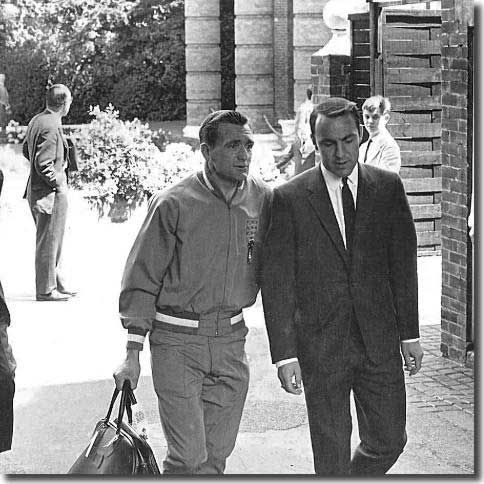 'We
are saying nothing about compensation at all. We are not discussing figures.
It is a personal thing. The salary is commensurate with managers' salaries
these days. We are talking in terms of a five-year contract.'
'We
are saying nothing about compensation at all. We are not discussing figures.
It is a personal thing. The salary is commensurate with managers' salaries
these days. We are talking in terms of a five-year contract.'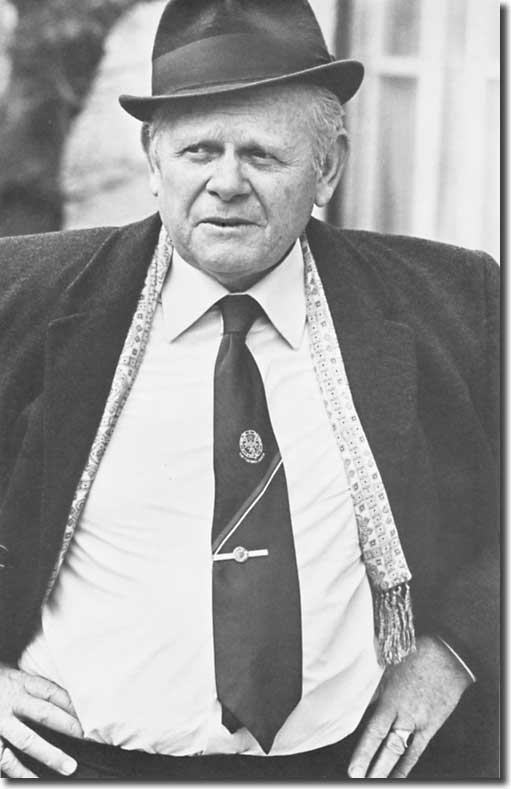 Revie's
requests for fixture rearrangements and postponements that might put Leeds
at an advantage. In football matters Revie was, in Hardaker's opinion,
devious, selfish and ruthless, and would cut corners to get his own way.
Revie had offended Hardaker the previous season by an oblique approach
to the League secretary's subordinates, with the aim of bringing forward
by 24 hours a League Cup tie against Bristol City. It was the impropriety
of Revie seeking to involve his juniors that had made Hardaker especially
indignant. On another occasion, Hardaker gave Revie short shrift when
the Leeds manager asked for a postponement because three of his key players
were badly injured. Hardaker noted drily that not only did all three make
sufficiently miraculous recoveries to play, but one scored twice and another
was, by general consent, the man of the match.
Revie's
requests for fixture rearrangements and postponements that might put Leeds
at an advantage. In football matters Revie was, in Hardaker's opinion,
devious, selfish and ruthless, and would cut corners to get his own way.
Revie had offended Hardaker the previous season by an oblique approach
to the League secretary's subordinates, with the aim of bringing forward
by 24 hours a League Cup tie against Bristol City. It was the impropriety
of Revie seeking to involve his juniors that had made Hardaker especially
indignant. On another occasion, Hardaker gave Revie short shrift when
the Leeds manager asked for a postponement because three of his key players
were badly injured. Hardaker noted drily that not only did all three make
sufficiently miraculous recoveries to play, but one scored twice and another
was, by general consent, the man of the match.
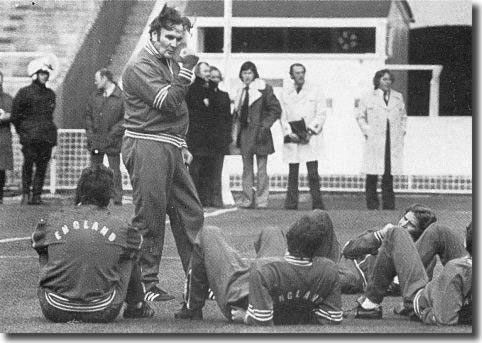
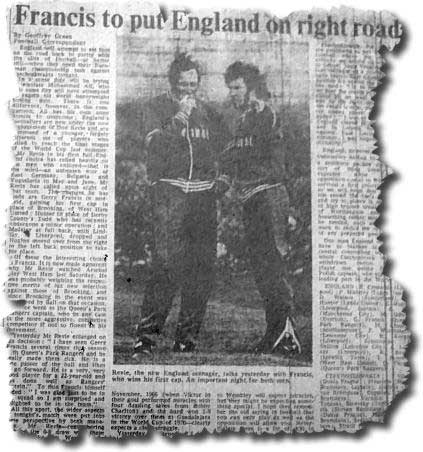 that
he would pair his Leeds goalscorer supreme Allan Clarke with the emerging
talents of Birmingham's exciting uncapped forward Trevor Francis, but
in the end both men withdrew through injury, as did Colin Todd and Tony
Currie.
that
he would pair his Leeds goalscorer supreme Allan Clarke with the emerging
talents of Birmingham's exciting uncapped forward Trevor Francis, but
in the end both men withdrew through injury, as did Colin Todd and Tony
Currie.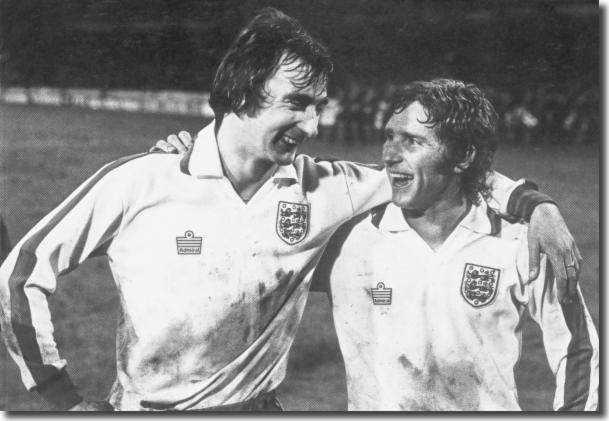 could
not live up to, so that I would fall flat on my face. Then he could leave
me out and continue to pick the likes of Trevor Cherry who served him
so well at Leeds United.
could
not live up to, so that I would fall flat on my face. Then he could leave
me out and continue to pick the likes of Trevor Cherry who served him
so well at Leeds United.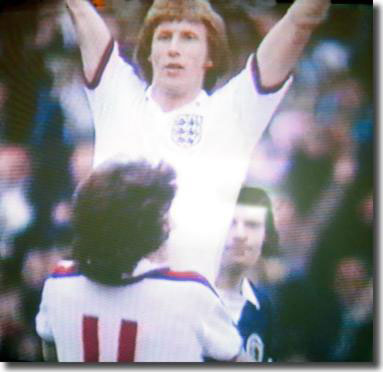 manager.'
manager.'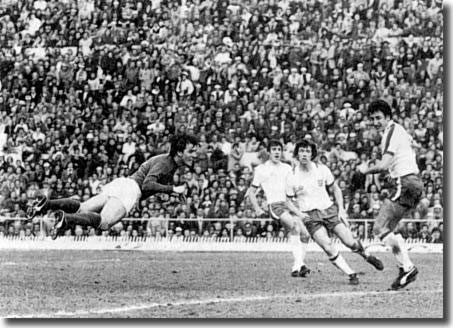 with
fire. He packed his line up with seasoned, defensive players, in the hope
of outmuscling Italy. Emlyn Hughes and Mick Mills were back in defence,
with Brian Greenhoff and Trevor Cherry deployed in midfield.
with
fire. He packed his line up with seasoned, defensive players, in the hope
of outmuscling Italy. Emlyn Hughes and Mick Mills were back in defence,
with Brian Greenhoff and Trevor Cherry deployed in midfield.